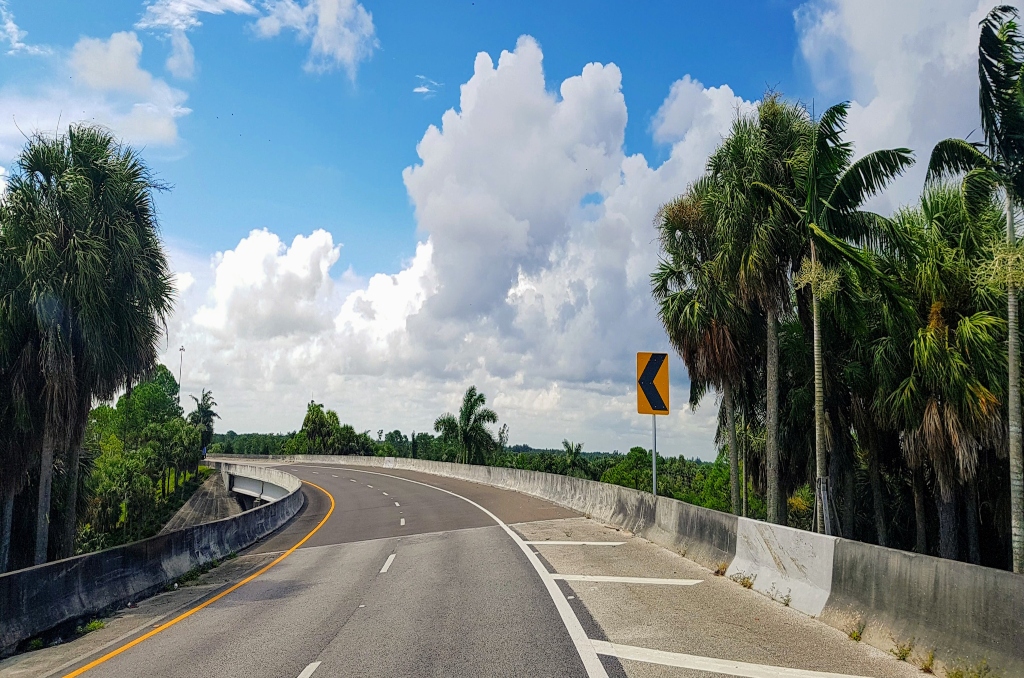Governor Ron DeSantis votes on radioactive road paving plan – Pictured: View of Florida Highway — Courtesy: Shutterstock — Viktoriya A
After Gov. Ron DeSantis ratified a contentious bill on Thursday, Florida is one step closer to paving its roads with phosphogypsum, a radioactive waste product from the fertilizer industry.
Conservation organizations had pushed DeSantis to veto the law, arguing that phosphogypsum would harm water quality and increase the risk of cancer in road construction workers.
“By signing off on this reckless handout to the fertilizer industry, Gov. DeSantis is paving the way to a toxic legacy generations of Floridians will have to grapple with,” said Elise Bennett, Florida and Caribbean director at the Center for Biological Diversity, in a statement sent to NPR.
The Environmental Protection Agency also has a stake in the matter because it oversees phosphogypsum and would have to approve any plan to utilize it in roadways.
“Any request for a specific use of phosphogypsum in roads will need to be submitted to EPA, as EPA’s approval is legally required before the material can be used in road construction,” the EPA told NPR on Friday.
Here are some important details regarding phosphogypsum and the new law.
What is the law’s purpose?
With the passage of the new law, phosphogypsum will be able to be used as a pavement aggregate alongside other materials including crushed stone, gravel, and sand. According to the Federal Highway Administration, industrial wastes and recycled materials have also been employed as aggregates recently.
As it investigates the use of phosphogypsum in roads, HB 1191 requires the Florida Transportation Department to carry out “demonstration projects using phosphogypsum in road construction aggregate material to determine its feasibility as a paving material.”
The measure sets an April 1, 2024 deadline for the Florida Department of Transportation to complete a study and provide a recommendation.
According to Bennett, who condemned the proposal, radioactive waste would be buried in roads “under the guise of a so-called feasibility study that will not address serious health and safety concerns” under the new law.
After receiving the measure officially, Gov. Ron DeSantis signed it into law a few days later. The proposal was overwhelmingly passed by the Florida Legislature, which is governed by Republicans.
Why is there so much phosphogypsum in the world?
Phosphorus is an essential component of fertilizer because it helps plants develop sturdy roots and productive crops. Phosphate rock is dissolved in sulfuric acid to produce phosphoric acid for use in fertilizer and a few other applications. The residue is phosphogypsum.
The standard production method, which has been in use since the 1840s, is not very effective. More than 5 tons of waste phosphogypsum are produced for every ton of phosphoric acid produced.
Since the 1800s, Florida has been a significant supplier; at the moment, according to the EPA, “Florida alone accounts for approximately 80 percent of the current capacity, making it the largest phosphate producing area in the world.”
Due to Florida’s prominent position, the state also contains huge trash locations known as “gypstacks.” These piles can be very big, measuring up to 800 acres and standing 200 feet tall. Over the years, because of sinkholes and other breaches, they have been connected to major water pollution.
Is Florida’s scheme lawful?
According to the EPA, “phosphogypsum remains prohibited from use in road construction,” as it has been for more than 30 years, nearly continuously.
Starting in October 2020, the EPA briefly reversed that guideline under previous President Donald Trump. But in June 2021, it reinstituted the rule.
The Florida law does not explicitly address the federal ban. In its accompanying documentation, it is stated that the EPA permits some applications for study, and that phosphogypsum is not legally a “solid waste” according to the law.
The EPA informed NPR that the legislation Florida lawmakers passed would not change the requirement that the U.S. EPA assess any proposed alternate uses of phosphogypsum on an individual, case-by-case basis.
The organization stated that Florida would need to submit an application for the plan’s approval, citing the federal rules code. The EPA would then launch a public comment period, publish its own technical review, and solicit feedback on the proposal, just like it would with any other proposed project.
Make sure you are staying up-to-date with the latest and most important Florida news with Florida Insider. Whether you are interested in business, education, government, history, sports, real estate, nature, weather, or travel: we have something for everyone. Follow along for the best stories in the Sunshine State.

William is the Managing Editor at FloridaInsider.com. His years of experience in journalism, broadcasting and multimedia include roles as a Writer and Web Producer. He graduated from Florida International University with a Bachelor of Science and Communication.

